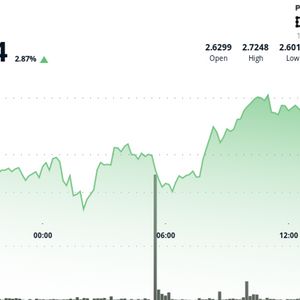BitcoinWorld Crucial: SEC Safe Harbor for dApp Developers Could Unleash DeFi Innovation The world of decentralized applications, or dApps, is buzzing with activity, yet often finds itself navigating a complex regulatory landscape. A significant move is underway as venture capital giant Andreessen Horowitz (a16z) and the DeFi Education Fund have formally urged the U.S. Securities and Exchange Commission (SEC) to establish a safe harbor for dApp developers . This proposal aims to provide much-needed clarity and foster innovation, potentially reshaping the future of digital finance. Why is an SEC Safe Harbor Crucial for dApp Developers? Currently, dApp developers face significant uncertainty regarding their legal standing. Many worry about being inadvertently classified as broker-dealers, which would subject them to stringent and often ill-fitting traditional financial regulations. This ambiguity can stifle creativity and slow down the development of groundbreaking decentralized technologies. The proposed SEC safe harbor seeks to address this by offering a temporary exemption. This would allow developers to build and iterate without the immediate threat of regulatory enforcement, provided they meet specific criteria designed to protect users and maintain market integrity. It’s about creating a sandbox where innovation can flourish responsibly. Unlocking DeFi Innovation: The Vision Behind the Proposal The core idea behind this petition is to unlock further DeFi innovation . Decentralized finance (DeFi) platforms, self-custodial wallets, and NFT marketplaces are integral to the crypto ecosystem. However, their unique, permissionless nature often clashes with existing regulatory frameworks built for centralized entities. A safe harbor could pave the way for more robust and user-friendly dApps. Developers would have the confidence to experiment with new protocols and services, knowing they have a clear path to compliance. This would not only benefit developers but also expand access to decentralized financial tools for a broader audience, fostering economic inclusion. Navigating Crypto Regulation: Specifics of the Proposed Exemption The petition outlines clear criteria for developers to qualify for this exemption from crypto regulation . While the exact details would need to be finalized by the SEC, the general premise is that developers would not be treated as broker-dealers even if their dApps facilitate transactions involving tokenized securities. This applies as long as they adhere to specific rules. Key aspects likely include decentralization thresholds, robust disclosure requirements, and perhaps limitations on direct control over user assets or protocols. The goal is to differentiate true decentralized systems from centralized platforms that merely use blockchain technology, ensuring the exemption benefits genuine decentralized efforts. Shaping Future Blockchain Policy: What’s Next for the SEC? This initiative by a16z and the DeFi Education Fund is a significant step in shaping future blockchain policy in the United States. It signals a proactive approach from the industry to engage with regulators and provide constructive solutions. The SEC’s response will be closely watched by the entire crypto community. Should the SEC adopt such a framework, it could set a global precedent for how governments approach decentralized technologies. It emphasizes the need for tailored regulations that understand the unique characteristics of blockchain and DeFi, rather than trying to fit square pegs into round holes. This dialogue is essential for responsible growth. In conclusion, the call for an SEC safe harbor for dApp developers represents a pivotal moment for the crypto industry. It highlights the urgent need for regulatory clarity to foster DeFi innovation and ensure the United States remains a leader in the digital economy. By providing a clear path, this framework could unleash a new wave of creativity and growth in decentralized applications, ultimately benefiting users worldwide and shaping progressive blockchain policy . Frequently Asked Questions (FAQs) What is a “safe harbor” in the context of crypto? A safe harbor is a legal provision that exempts certain activities or entities from liability or regulation, provided they meet specific conditions. In crypto, it would temporarily shield dApp developers from certain SEC oversight. Why are a16z and the DeFi Education Fund proposing this? They believe current crypto regulation is unclear for dApps, stifling innovation. A safe harbor would provide clarity and allow for responsible development without immediate regulatory burdens. How would a safe harbor benefit dApp developers? It would reduce legal uncertainty, encourage experimentation, and accelerate the development of decentralized technologies, leading to more robust DeFi innovation . What types of dApps would this safe harbor apply to? It would primarily apply to decentralized exchanges, self-custodial wallets, and NFT marketplaces, exempting them from being classified as broker-dealers under specific criteria. What are the next steps for this proposal? The proposal has been formally submitted to the SEC. The next step involves the SEC reviewing the petition and deciding whether to initiate a rulemaking process to establish such a framework. Did this article shed light on the future of crypto regulation? Share this important update with your network on social media and spark a conversation about the vital role of regulatory clarity in fostering innovation! To learn more about the latest crypto regulation trends, explore our article on key developments shaping blockchain policy institutional adoption. This post Crucial: SEC Safe Harbor for dApp Developers Could Unleash DeFi Innovation first appeared on BitcoinWorld and is written by Editorial Team













